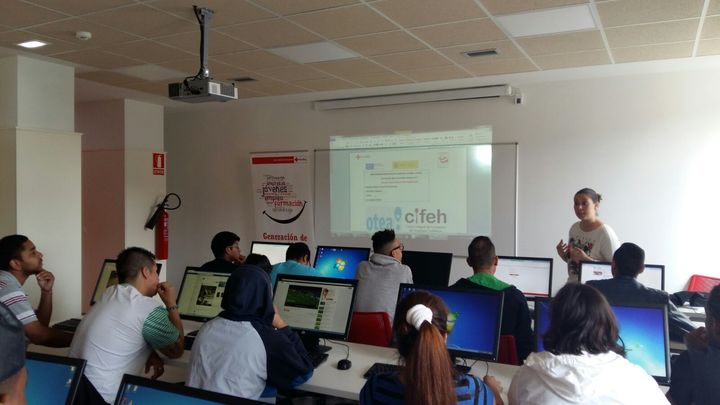Helping young people into their first job
On 26-27 October 2017, the Spanish Red Cross attended the Youth Guarantee Mutual Learning Forum – a European workshop hosted by the European Commission Directorate General for Employment, Social Affairs and Inclusion. The Youth Guarantee was launched in 2013 to support EU countries to provide young people with access to employment, continued education, apprenticeships, and traineeships. While millions of young people across Europe have benefitted from the programme so far, youth unemployment remains high in many countries.
The forum facilitated mutual exchange and learning between practitioners with the aim of improving services and specific support for young people who are difficult to reach. The Spanish Red Cross was asked to share experiences from its “PULSA empleo” (PULSA employment) initiative. Within just one year, this project brought together 3,790 young people and 932 companies throughout Spain. We spoke to Eva Chimeno Cano, who works on social intervention and employment support at the Spanish Red Cross and attended the forum to present her work.
Eva, you are in Brussels at the Youth Guarantee Mutual Learning Forum organised by the European Commission. Can you describe – in your own words – what the Youth Guarantee is all about?
“The Youth Guarantee system is a support mechanism addressing young people from the ages of 16 to 29. It aims to activate young people’s participation in the labour market by starting a job, continuing their education, or finding an apprenticeship,” explains Eva Chimeno Cano.

Why and how is the Spanish Red Cross is involved in employment support?
“Since 2000, Spanish Red Cross has been working on the Employment Plan with the objective of supporting people who are socially excluded or very far from the labour market to find a job or improve their professional qualifications. Spanish Red Cross has developed several projects related to this objective, for example on labour-market insertion pathways, updating professional qualifications, specific measures to support employment, vocational training, and learning by working.”
What was the purpose of the Youth Guarantee Forum? What was your contribution?
“The purpose of the forum was to exchange best practices between EU Member States in the implementation of the Youth Guarantee system. Ninety per cent of the participants represented public employment services in different EU countries, the others were from Non-Governmental Organisations (NGOs). Spanish Red Cross contributed a presentation to the workshop ‘Supporting young people facing multiple barriers’. This workshop provided an opportunity to discuss and exchange practical experiences in relation to how the Youth Guarantee can engage and support young people facing multiple obstacles to re-integration. Spanish Red Cross presented ‘PULSA empleo’”.
You say young people are facing various barriers to get into the labour market. What is a typical situation for an unemployed young person in Spain today?
“The basic difficulties faced by any young Spaniard when searching for a job are: the high level of unemployment, a lack of employment opportunities, and little financial support for training. Apart from this, young people in situations of social disadvantage face other barriers, such as poverty, racial discrimination, social exclusion, or disability. Often, their employment profile is far from what the market is looking for, starting with low level of studies”.
Helping young people to become appealing candidates for employers encompasses more than professional and technical aspects. What other elements does your support and training include?
“If the young person needs it, we offer financial assistance for transportation, enrolment fees for external training, and for nursery costs. Apart from this, we help young people, especially women, to reconcile their family and professional lives. We also give social aid such as support for housing, or house supplies.”
When a young person finds a job thanks to your programme, do you offer further support ‘on the job’? What does this involve?
“We follow up with young people once they have integrated into the job market to find out if he/she is happy with the job or needs more support from Spanish Red Cross”.
There is a lot of talk in EU context about helping young people to find work abroad. Would you support this ambition or rather promote local employment?
“We promote local employment, because most of our young beneficiaries don’t speak another language, and don’t have geographical flexibility. Our employment support team looks for job opportunities at the local level. Furthermore, it is very expensive to move to another country so that can also be a barrier.”
Finally, if other organisations or authorities working with unemployed young people wish to develop their own services, what would your most important piece of advice to them be?
“It is important to have good guidance staff to work with each person, and adapt the methodology to reflect the mentality of young people. You need to analyse the conditions and needs of each participant individually. And of course, you have to involve the partner companies from the very beginning of the project”.
About the Youth Guarantee
In 2013, the 28 Member States of the EU launched a joint initiative the improve access to employment, continued education, apprenticeships or traineeships for young people under the age of 25. Each country presented national Youth Guarantee Implementation Plans outlining dedicated measures to support young people in their transition from school to work. The European Commission published all 28 national implementation plans, as well as national contact points in each country for young people to sign up to Youth Guarantee services.
Read more about “PULSA empleo” at the Youth Guarantee Learning Forum:
For media inquiries, please contact Eva Oyón on: eva.oyon@redcross.eu or +32 2 235 09 22

